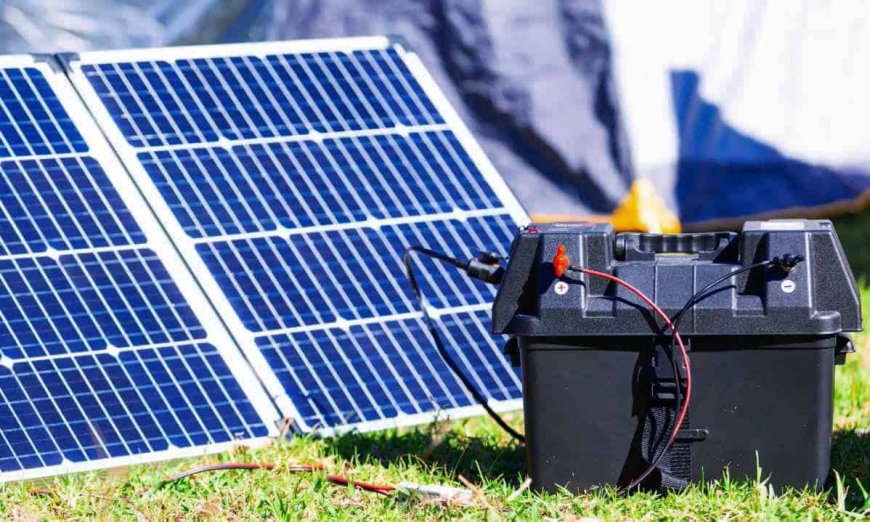The Power Behind Solar Energy: Understanding Solar Batteries
Solar batteries are typically paired with residential or commercial solar systems to create a more self-sufficient and resilient energy solution.

As solar energy continues to gain popularity as a sustainable and cost-effective power source, solar batteries have emerged as an essential component in maximizing the efficiency and reliability of solar systems. These innovative storage solutions allow homeowners and businesses to store surplus energy generated during the day for use at night or during power outages.
What is a Solar Battery?
A solar battery is a device that stores energy produced by solar panels. Instead of sending all the electricity directly to the grid, the battery saves the excess power for later use. This functionality is particularly useful in areas where energy consumption patterns differ throughout the day or where grid reliability is a concern.
Solar batteries are typically paired with residential or commercial solar systems to create a more self-sufficient and resilient energy solution.
How Do Solar Batteries Work?
Solar batteries work by capturing and storing the energy generated by solar panels. Here's a simple breakdown of the process:
- Energy Generation: Solar panels convert sunlight into electricity.
- Battery Charging: Excess electricity is directed to the battery instead of being sent back to the grid.
- Energy Storage: The battery holds the surplus energy for later use.
- Power Usage: During periods of low sunlight or power outages, the stored energy is used to power appliances and devices.
Types of Solar Batteries
Several types of solar batteries are available, each with unique features and benefits:
- Lithium-Ion Batteries: The most popular choice due to their high efficiency, long lifespan, and lightweight design.
- Lead-Acid Batteries: A more affordable option, often used for off-grid systems, but with shorter lifespans and lower efficiency compared to lithium-ion batteries.
- Flow Batteries: Known for their scalability and durability, these are suitable for large-scale energy storage solutions.
- Nickel-Cadmium Batteries: Durable and capable of operating in extreme temperatures, but less commonly used due to environmental concerns.
Benefits of Solar Batteries
Investing in a solar battery offers several advantages that enhance the overall functionality of a solar energy system:
- Energy Independence: Solar batteries reduce reliance on the grid, providing a consistent power supply even during outages.
- Cost Savings: By storing energy for use during peak hours when electricity rates are high, solar batteries help lower energy costs.
- Environmental Benefits: Solar batteries allow users to maximize renewable energy usage, reducing their carbon footprint.
- Increased Resilience: During emergencies or natural disasters, solar batteries ensure uninterrupted power for critical devices.
- Optimized Solar Usage: Instead of exporting excess energy to the grid, batteries store it for future use, increasing the efficiency of the solar system.
Factors to Consider When Choosing a Solar Battery
Selecting the right solar battery is crucial for maximizing its benefits. Here are key factors to consider:
- Battery Capacity: Measured in kilowatt-hours (kWh), this indicates how much energy the battery can store. Choose a capacity that aligns with your energy needs.
- Depth of Discharge (DoD): The percentage of the battery’s capacity that can be used without affecting its lifespan. A higher DoD indicates better efficiency.
- Round-Trip Efficiency: The percentage of stored energy that can be retrieved and used. Look for batteries with high round-trip efficiency for optimal performance.
- Lifespan: Measured in charge-discharge cycles, this determines how long the battery will last. Lithium-ion batteries typically have a longer lifespan.
- Cost: While solar batteries can be expensive, their long-term benefits often justify the investment. Compare options to find the best value for your needs.
Maintenance and Longevity
Solar batteries require minimal maintenance, making them a convenient addition to solar systems. Regularly checking the battery’s health, ensuring proper ventilation, and cleaning connections are some basic upkeep measures. With proper care, modern solar batteries can last 10 to 15 years or more, depending on the type and usage.
The Future of Solar Energy Storage
Advancements in technology are continuously improving the efficiency, capacity, and affordability of solar batteries. Innovations such as solid-state batteries and AI-powered energy management systems are expected to revolutionize the way energy is stored and utilized. These developments will make solar energy more accessible and reliable, accelerating the global shift toward renewable energy.
Conclusion
Solar batteries are transforming the way we use solar energy, making it more reliable, efficient, and practical. By storing excess energy and reducing dependency on the grid, they empower individuals and businesses to embrace energy independence and sustainability.
Whether you're a homeowner looking to optimize your solar system or a business aiming to reduce energy costs, solar batteries are a valuable investment for a greener and more resilient future. With the right battery, you can unlock the full potential of solar energy and take a significant step toward a sustainable lifestyle.
What's Your Reaction?




























